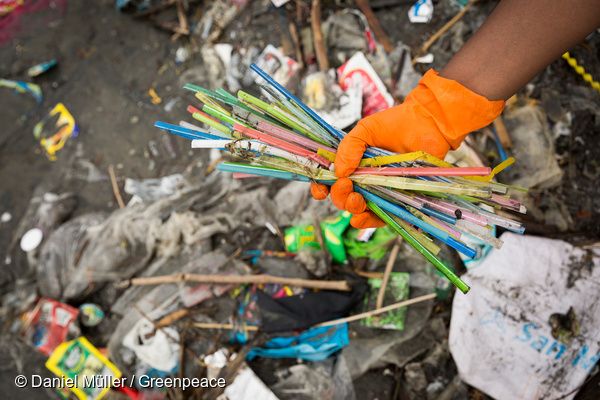
Nestlé, Unilever, P&G Among Worst Offenders for Plastic Pollution in Philippines Beach Audit

Jilson Tiu / Greenpeace
A week-long beach clean up and audit at Freedom Island in Manila Bay has exposed the companies most responsible for plastic pollution in the critical wetland habitat and Ramsar site—one of the worst locations for plastic pollution in the Philippines.
The Greenpeace Philippines and #breakfreefromplastic movement audit, the first of its kind in the country, revealed that Nestlé, Unilever and Indonesian company PT Torabika Mayora are the top three contributors of plastic waste discovered in the area, contributing to the 1.88 million metric tonnes of mismanaged plastic waste in the Philippines per year.
“When we throw something away, there is no ‘away.’ The Philippines is the third biggest source of plastic ocean pollution because global corporations are locking us into cheap, disposable plastics, rather than innovating and finding solutions,” said Abigail Aguilar, campaigner for Greenpeace Philippines. “These corporations are the missing piece in the global fight against plastic pollution. Citizens are burdened with the social and environmental impacts of plastic waste, rather than those that are responsible.”
During the clean up, Greenpeace volunteers and coalition partners from the #breakfreefromplastic movement, found items ranging from styrofoam to footwear, along with single-use plastics such as bags, plastic bottle labels and straws. A total of 54,260 pieces of plastic waste were collected during the audit, with most products being sachets.
Developing countries, such as the Philippines, run on a “sachet economy,” which encourages the practice of buying fast moving consumer goods in small quantities. This drives market and profit share for most companies by making it more accessible to people with limited incomes. However, low-value single-use sachets are not collected by waste pickers and usually end up in landfills or scattered indiscriminately as litter in the streets or marine debris.
“It’s time these companies stop business-as-usual and use their resources to innovate and redesign their packaging and delivery solutions,” Aguilar said. “They could for instance practice extended producer responsibility where companies substitute non-reusable and non-recyclable products with new systems, such as refillables—prevention instead of end-of-pipe waste management. In the long term they’ll see this will yield strong environmental and economic benefits.”
.@Unilever @ProcterGamble @Nestle named in Philippines plastic pollution beach audit #BreakFreeFromPlastic >> https://t.co/cRxclr6yvR pic.twitter.com/6O6tAmmn2x
— Greenpeace (@Greenpeace) September 22, 2017
The Philippines ranks as the third worst polluter of the world’s oceans, with China as number one. In a study, China, Indonesia, Philippines, Thailand, Vietnam and Malaysia also fall in the list of top 10 countries with mismanaged plastic waste. While their economies are growing, this new-found spending power has led to “exploding demand for consumer products that has not yet been met with a commensurate waste-management infrastructure.”
ASEAN (Association of Southeast Asian Nations) countries, due to their lengthy coastlines and high plastic usage, are some of the primary sources of marine plastics globally. Asia-Pacific Economic Cooperation estimates that the cost to the tourism, fishing and shipping industries was US$1.2 billion in the region alone.
Greenpeace conducted the plastic waste brand audit as part of the #breakfreefromplastic movement alongside its member organizations Mother Earth Foundation, Ecowaste Coalition, Global Alliance for Incinerator Alternatives and Health Care without Harm.
These are the companies that have been found most responsible for plastic pollution on Freedom Island:
- Nestle
- Unilever
- PT Torabika Mayora
- Universal Robina Corporation
- Procter & Gamble
- Nutri-Asia
- Monde Nissin
- Zesto
- Colgate Palmolive
- Liwayway

 233k
233k  41k
41k  Subscribe
Subscribe 
